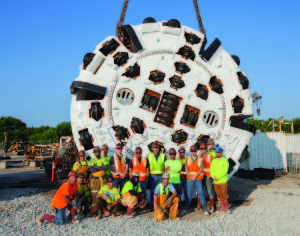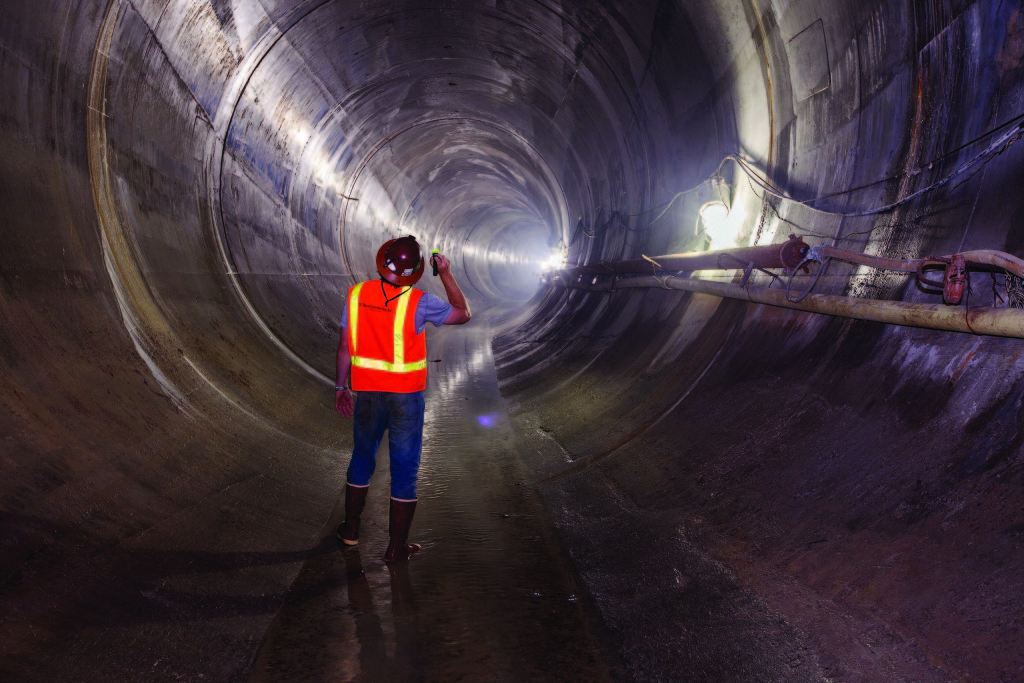Written by: Desiree Willis, Technical Writer, 253.872.4490
Robust Machine Tackles DigIndy Network of Tunnels in Autumn Launch
On Tuesday, September 6, 2016, one of the longest-running Robbins TBMs embarked on its most extensive project yet. The 6.2 m (20.2 ft) Main Beam machine, owned by the Shea-Kiewit (S-K) JV, is boring the 8.5 km (5.3 mi) long White River Tunnel as the first in the next phase of the DigIndy wastewater tunnels below Indianapolis, Indiana, USA. In addition to that work, the machine will bore the Lower Pogues Run, Fall Creek, and Pleasant Run Tunnels—a scope of work totaling about 28 km (17 mi) through limestone and dolomite rock.
The rebuilt Robbins hard rock TBM was first used in Indianapolis on the 12.5 km (7.8 mi) long main tunnel, called the Deep Rock Tunnel Connector (DRTC). On that tunnel, the speedy machine achieved world records in its size class of 6 to 7 m (20 to 23 ft), including “Most Feet Mined in One Day” (124.9 m/409.8 ft); “Most Feet Mined in One Week” (515.1 m/1,690 ft); and “Most Feet Mined in One Month” (1,754 m/5,755 ft). “It’s nice to start the job with a machine that has already been proven and successful,” said Stuart Lipofsky, Project Manager for S-K JV.
However the DRTC was far from the TBM’s first job. The machine, originally built in 1980, has been used on New  York City’s Second Avenue Subway, as well as projects in Massachusetts and Canada. Once the machine has completed the DigIndy network of tunnels, it will have bored more than 51 km (32 mi) of tunnel—an achievement making it one of the hardest working Robbins TBMs ever put into service. “The age of the machine wasn’t a concern for us, it was a positive. We knew it could perform in harder, abrasive rock,” said Lipofsky.
York City’s Second Avenue Subway, as well as projects in Massachusetts and Canada. Once the machine has completed the DigIndy network of tunnels, it will have bored more than 51 km (32 mi) of tunnel—an achievement making it one of the hardest working Robbins TBMs ever put into service. “The age of the machine wasn’t a concern for us, it was a positive. We knew it could perform in harder, abrasive rock,” said Lipofsky.
The machine was launched from the 67 m (220 ft) deep White River shaft following a refurbishment that included new motors, gearboxes, electronics, and other elements. As of the last week of September, the TBM has bored over 300 m (1,000 ft) of the White River Tunnel. About one mile into the White River Tunnel, the drive will bifurcate eastwards to bore the 2.7 km Lower Pogues Run Tunnel in front of Lucas Oil Stadium in downtown Indianapolis. The machine will then be backed up to the bifurcation point before continuing north for completion of the White River Tunnel.
As the machine bores, Robbins continuous conveyors remove muck in an extensive system that was highly successful at the DRTC. Much of the conveyor structure remains the same for the new tunnels, with new horizontal and conveyor belting provided. The conveyors will wind through curves as sharp as 300 m (1,000 ft) in radius, as the tunnels follow the path of the White River overhead.
The S-K JV has until 2021 to complete the White River and Lower Pogues Run tunnels for local owner Citizens Energy Group, and until 2024 to complete all the tunnels. The use of one TBM was seen as a positive: “The use of one machine was more efficient for our crews. The schedule allowed us to run with one TBM and we feel we can do it with one machine. It also was a less costly option than running two machines in terms of the owner funding the project,” said Dan Martz, vice president for J.F. Shea. Once complete, the EPA-mandated deep tunnel project will reduce the amount of raw sewage overflows and clean up tributaries along the White River.
Image 1: The S-K JV stands proudly in front of the cutterhead for the 6.2 m (20.2 ft) diameter Robbins TBM currently boring the DigIndy tunnels.
Image 2: Robbins continuous conveyors will remove muck from the windy route that follows the White River overhead and contains curves as sharp as 300 m (1,000 ft) in radius.
